Victoria and SA to close border with NSW amid new COVID-19 cases, WA shuts out Victoria
Victoria has followed South Australia’s lead and decided to shut its border to NSW after it found more COVID-19 cases. WA and the NT also made changes.
Coronavirus
Don't miss out on the headlines from Coronavirus. Followed categories will be added to My News.
Victoria has followed South Australia’s lead and decided to shut its border to the entire state of NSW from 11.59pm on New Year’s Day after it found another two cases, which takes its numbers to eight.
Victorian Acting Premier Jacinta Allan said it was not “an easy choice”.
“Closing borders putting in place restrictions is never an easy choice to make, certainly not one we wanted to be making and announcing on a day that is supposed to be about celebrating, as we have seen throughout the course of 2020, this has been a difficult year, with many difficult decisions to make, as a consequence of a virus that causes great damage to the health and well-being of our community, unfortunately the virus doesn’t expire at midnight tonight and we have to remain vigilant,” she said.
It means that from January 2 the entire state of NSW will become a red zone.
Anyone who returns from NSW between now and January 1 (excluding current red zones) will need to undertake a test and go into isolation for 14 days.
It comes as South Australia is closing its border to a ‘volatile’ NSW from midnight December 31.
Western Australia’s acting premier Roger Cook has said it has now declared Victoria to be a medium risk.
He said Victoria will become a “medium risk” state from 12.01am, January 1.
This means people will not be able to enter Victoria unless they are an “exempt traveller”.
There will be a list of exemptions, which will be the same as are in place for NSW.
WA residents on holidays in Victoria will be “dealt with on a compassionate basis”, case by case.
These returning Western Australians will have to self-quarantine for 14 days when they arrive back home, and they will need to have a Day 11 Covid-19 test,” he said.
Anyone who has arrived in Western Australia from Victoria on or after 21 December will need to self-quarantine immediately.
“They will need to be in self-quarantine for 14 days from when they arrived in Western Australia and get a Covid-19 test at any point symptoms develop,” he said. “They will also need to present to a COVID-19 clinic for a test on day 11.”
The Northern Territory health minister, Natasha Fyles, also said all of greater Sydney will become a hotspot from midnight December 31.
“This means anyone arriving from Greater Metropolitan Sydney into the Territory after midnight tonight will go into mandatory quarantine, either at the Top End in Howard Springs or in Alice Springs,” she said.
The borrder closures emerged after NSW recorded ten new coronavirus cases overnight.
Of these, five are linked to the northern beaches Avalon cluster, three were members of the Croydon cluster, one is linked to the transport worker cluster and one is currently under investigation.
“Pleasingly, we have seen the numbers go down today but it’s very volatile. They’re going to bounce around and what is really important is for all of us to do everything we can to reduce our mobility, to reduce the number of people that we’re mixing with and to make sure that we stick to the rules and the health advice that’s been provided,” NSW Premier Gladys Berejiklian said during a press conference on Thursday, where she again implored people to wear face masks in indoor settings.
SA Premier Steven Marshall said exemptions will be made for residents returning home, essential workers and travellers, and people making permanent moves to the state, however all will be required to self-isolate for 14 days upon return.
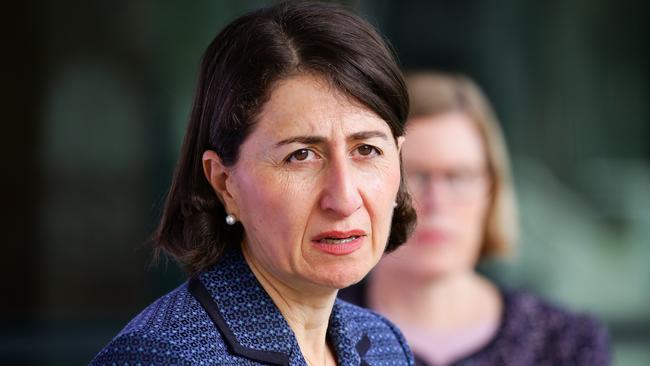
Meantime, Victoria has recorded three new cases overnight, bringing the state’s total to 10 active cases.
Of the 10 cases, four are community cases and six are in hotel quarantine.
The rise in new cases has led to the government issuing dramatic last-minute changes to New Year's Eve plans.
As of 5pm Thursday masks will become mandatory indoors again and gatherings will be reduced from 30 to 15 people.
“We do apologise to people who have put plans in place, who was looking forward to having events in their home, or in other people’s homes, but this is a necessary step. It is on the advice that we have received overnight of the new cases and the exposure sites, and we do need to take the steps to keep Victorians safer,” Ms Allan said during a press conference on Thursday.
Ms Allan also told “only people with a booking at a hospitality venue” to travel into the Melbourne CBD.
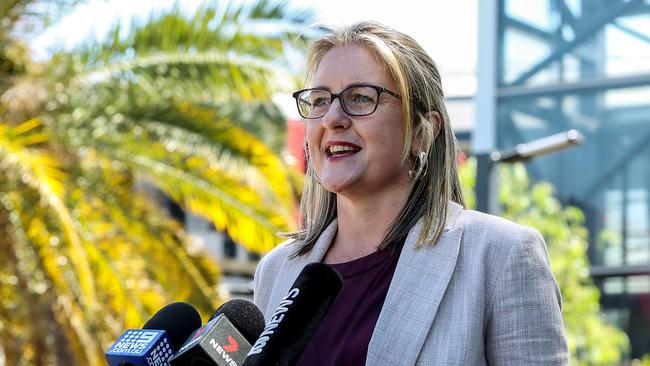
“We apologise for the short notice but this virus does not respect New Year’s Eve,” Health Minister Martin Foley said.
Of the new cases identified, three have been linked to the Smile Buffalo Thai restaurant in Black Rock. The restaurant hosted one case, two close contacts of cases, and a returned traveller from NSW on December 21.
Ms Allan advised that the traveller returned before the border permit system was introduced. The government is now calling on anyone who dined at the restaurant on December 21 to present for testing.
None of the new community cases have been linked to hotel quarantine.
Health authorities say the cases are from Mentone, Hallam and Mitcham, and are believed to be linked to the Sydney outbreak. Two of the women are believed to be in their 40s, while one is in her 70s.
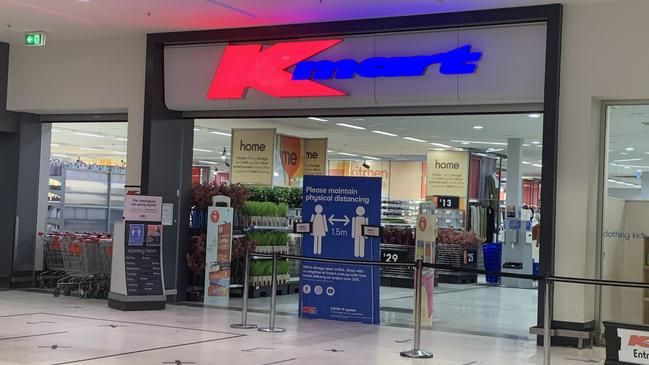
The Victorian Department of Health has released a list of potential exposure sites visited by the three women, which includes the popular Fountain Gate Shopping Centre on Boxing Day.
Within the shopping centre, potential exposure sites include Kmart, Big W, Target, Millers, Kings of Gifts and Lacoste.
The women also visited the Holy Family Catholic Church in Doveton on the same day, the Mentone/Parkdale Beach on December 27, and Century City Walk and Mocha Jo’s in Glen Waverley, and Katialo Restaurant in Oakleigh on December 28.
On Thursday, Victoria’s Commander of COVID-19 response Jeroen Weimar said the state’s Department of Health and Human Services worked throughout the night to carry out contact tracing and contact those potentially at risk.
“We have three cases that are self-isolating at home and are being supported and monitored by the Department of Health and Human Services,” Mr Weimar said.
“We have been in this position before and we are deploying our full outbreak approach around these cases.”
Mr Weimar said that there are currently more than 40 primary close contacts that have been ordered to self-isolate.
The new cases were revealed hours after the Victorian state government announced it would tighten its border closure to NSW after new cases were detected in Woollongong and the Blue Mountains.
Authorities announced anyone intending to return to Victoria from these areas between midnight tonight and 11.59pm on 31 December must now apply for a travel permit, will be required to undergo testing within 24 hours of returning to the state, and must self-isolate for 14 days.
No one will be permitted entry after December 31.
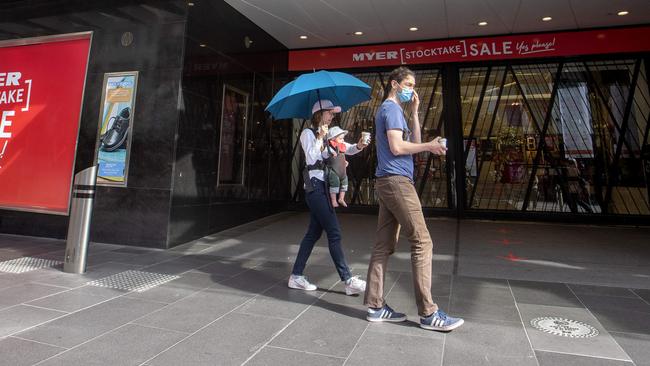
SYDNEY CLUSTER SPREADS
On Wednesday, cases emerged in the Blue Mountains, Woollongong and Shellharbour regions.
The Greenwell and Thomas Pharmacy in Katoomba announced an employee had tested positive for the virus via Facebook, writing, “A staff member working on Saturday 26th and Sunday 27th of December has had a positive COVID-19 test.”
Earlier, six new cases were linked to a family at Croydon in city’s inner west and strict new restrictions in effect for New Year’s.
“There are six cases – three adults and three children, all members of the same extended family and they‘re all linked to the cluster in the inner west which we’re now calling the Croydon cluster,” Dr Kerry Chant said.
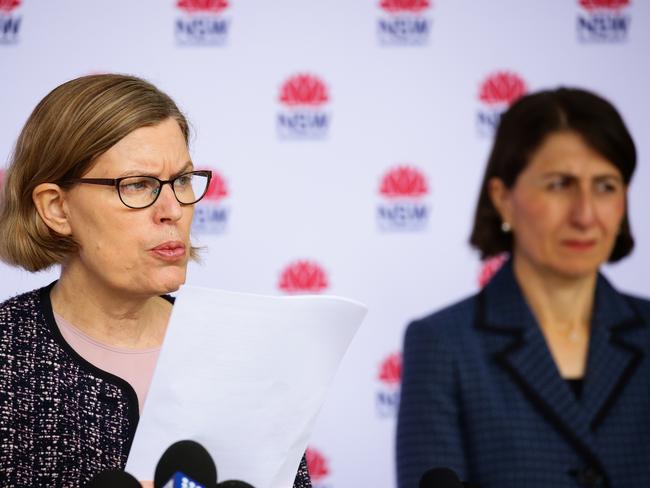
“One of these cases was first reported yesterday morning, as that case had come in very late the prior night.
“We are expecting there will be additional cases linked to that cluster just because of the number of close contacts and the close household contact that a number of those contacts had over the period of Christmas and the following days.
“That Croydon family had a number of gatherings over a number of days. There were (at least) 34 close contacts.”
Ms Berejiklian said people in Greater Sydney would now only be allowed to have five visitors to their households, including children.
Before New Year’s Eve, Greater Sydney residents could have 10 people inside the home.
The outdoor gathering limit has also been reduced from New Year’s Eve, from 50 to 30 people allowed at a gathering.
The two rule changes apply to Greater Sydney, including Wollongong, the Central Coast, and the Nepean Blue Mountains.
Meantime, those hoping to cross the border and get back into Victoria after the New Year have been dealt a major blow.
Minister for Police Lisa Neville said it was a “day-by-day proposition” but warned the level of coronavirus being transmitted across greater Sydney meant the border would remain shut beyond New Year’s.
“The level of restrictions in place, the number of cases … will inform the health advice to government about the border,” she told reporters on Wednesday morning.
“I don’t think we’re in a position yet to be contemplating opening the border. But we’ll weigh up all the those issues.”
MUTANT STRAIN
The first case of a more contagious coronavirus strain has been recorded in Queensland.
The South African “mutant” strain was detected in a returned traveller in hotel quarantine, however Queensland Health Minister Yvette D’Ath said there was “no risk” to the public.
It came after a contagious UK strain has also been documented here in recent weeks. “We have seen other jurisdictions record a UK variant,” she said. “But this is the first time the South African one has been identified in Australia.
“The positive news – the good news about this individual – is that they were in hotel quarantine at the time they were tested and they have since been transferred to a hospital, and we are absolutely confident that all proper measures were taken at the hotel, and in the transfer, and of course at the hospital in relation to this positive case.”
She also said fragments of the virus were detected in five waster-water facilities in Brisbane, including Victoria Point, Oxley Creek, Goodna, Fairfield and Redcliffe.
‘WE CAN DEPORT THEM’: COVIDIOTS
The Department of Home Affairs will now work with NSW to identify temporary visa holders who breached coronavirus restrictions in Sydney over Christmas, to potentially deport them from Australia.
Immigration Minister, Alex Hawke, who was recently sworn in as the new minister during Scott Morrison’s Cabinet reshuffle, told 2GB radio station in Sydney that tourists found to have “flagrantly” disobeyed the public health orders could have their visas cancelled and be placed into immigration detention.
He also said the government may charter flights to deport some.
“I was shocked at the scenes on Bronte beach [on Christmas Day] … Absolutely under the Migration Act if someone is threatening public safety or health their visa can be cancelled and revoked,” he said.
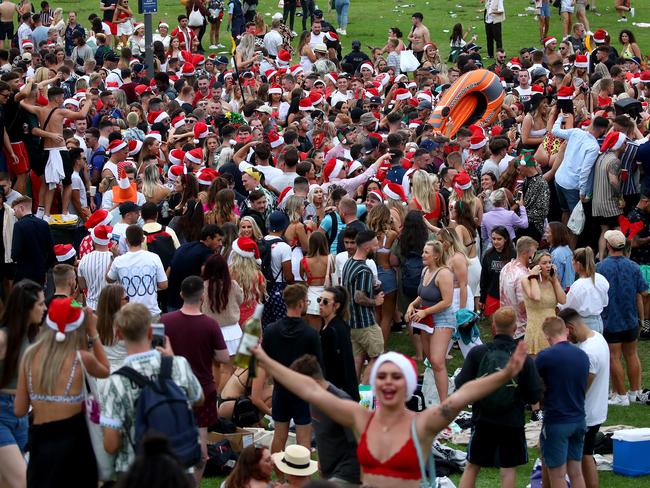
“One possible consequence is deportation, obviously. We can deport people. We have chartered flights to continue the normal process of immigration overseas where we return people to home countries.”
Mr Hawke said they did not want to have public health and safety jeopardised by a small group of people who are not respecting the country.
“They know the situation in their home countries is worse in many respects,” he said.
“There are many options available to the department, you can put them into immigration detention, but obviously there’s consequences to some of those things.
“However, you know, what will happen is we’re very happy to deport people, we’re very happy to make sure if people are flagrantly disobeying public health orders and risking the health and safety of Australians and our other temporary visa holders, we will look at those options.”
Senator Kristina Keneally told News Corp it was an “empty threat”.
“It’s hard to see how Mr Hawke could actually carry out his threat given Department of Home Affairs bureaucrats are already overwhelmed with 300,000 people on bridging visas, 100,000 waiting for partner visas and 150,000 waiting for their citizenship application to be processed,” she said.
“Everyone in Australia should follow Health directions and face the consequences if they don’t.
“But, these kinds of empty threats can actually do more harm than good, and I would encourage the Minister to make sure his Department can actually do what he says, before making promises again in the future.”
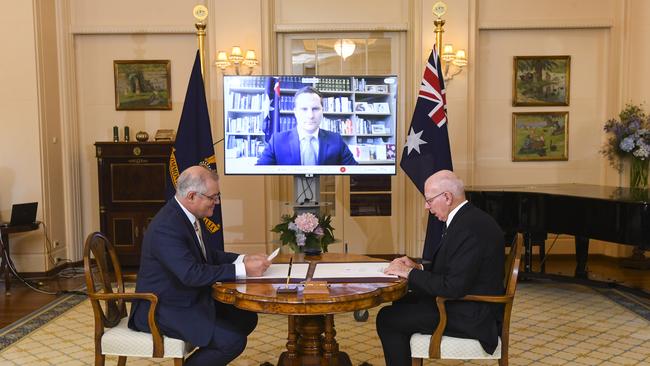
VACCINE IS ‘AHEAD OF SCHEDULE’
Federal Health Minister Greg Hunt has confirmed Australia’s vaccine program is “on track and ahead of schedule”.
Mr Hunt believes all Australians will be vaccinated by October between the three different vaccines. The vaccine will be free, and entirely voluntary.
“We’ve had some very important news. We see the AstraZeneca vaccine is making progress both in the UK, in the US, and in Europe,” Mr Hunt said.
“I’ve been briefed this morning by the global head of AstraZeneca and the Australian head of AstraZeneca. Our vaccine program is on track and ahead of schedule.
“They (AstraZeneca) have submitted additional data within Australia and we’re expecting the final data for consideration in late January to early February. Pfizer should be complete during January.
“We would like to see as many Australians as possible be vaccinated, but in order to do that, they have to have the confidence that our regulators are making sure that every safety step is taken, and we’re ticking all of those boxes just a little bit earlier than expected.”
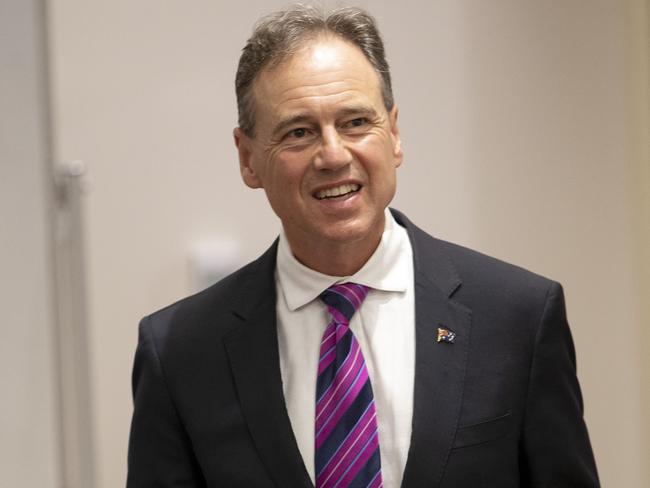
NEW COVID REPORT SHOWS NEW FINDING
Startling new figures in the NSW government’s weekly COVID surveillance report have unearthed a frightening fact.
Many of those who have coronavirus, have no idea they’ve got it.
The public first became aware of the outbreak on Sydney’s northern beaches on December 16, and in the following days infections rose sharply before a local lockdown and other public health measures slowed down the spread.
A new breakdown of data collected by NSW contact tracers and virus testers shows nearly everyone who tested positive before December 16 felt sick or were displaying symptoms of COVID-19.
But as scores of venues were added to a list of locations where patrons were urged to get tested “immediately”, more and more asymptomatic people were diagnosed with the highly contagious virus, suggesting many could be infected, and infecting others, without knowing.
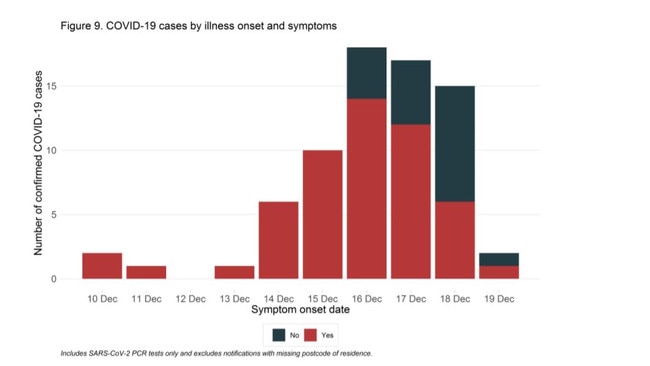
A graph included in the latest weekly COVID-19 surveillance report shows a growing proportion of cases were asymptomatic in the days after the outbreak became known.
“The majority of cases reported having symptoms at the time diagnosis at the start of the outbreak,” NSW Health officials write in the report.
“Rapid targeting messaging to people in the Northern Beaches area advising them to get tested led to a larger proportion asymptomatic cases at diagnosis in the later stages of the outbreak.”
In the seven days up to December 19, there were 19 people who received a positive COVID-19 diagnosis despite not feeling any symptoms.
“(Those people) had sought testing because they were either close contacts or had been in a venue that had been visited by confirmed cases of COVID-19,” the report authors wrote.
Identifying COVID-19 infections before symptoms arise has been identified as a key goal in the state’s fight against the coronavirus, the report says.
VIC BORDER REMAINS CLOSED TO NSW FOR NYE
Victorian Health Minister Martin Foley said the border between the states will stay closed for at least another week.
“Well, it’s certainly not going to be this week and we’ll continue to take the advice of public health officials as to when that will be the case,” he said.
“There is no chance of the borders reopening for New Year’s Eve … we want to make sure those borders, particularly to the red zones of Sydney and the Central Coast, stay shut down.”
Regional NSW remains open for free travel into Victoria.
BORDER RULES AND TRAVEL RESTRICTIONS
NSW
The NSW State Government announced a string of new rules ahead of New Year’s.
For New Year’s Eve in Sydney (including Wollongong, Central Coast and Blue Mountains) the following will apply:
* Household gatherings will be limited to 5 visitors (including children).
* The limit for outdoor gatherings will be reduced from 50 to 30.
Restrictions for the northern zone of the Northern Beaches remain the same but for the southern zone of the Northern Beaches the following will now apply;
* Household gatherings will be limited to 5 visitors from within your zone (including children).
These changes come into effect from midnight on December 30 and will be in place until further notice.
The above joined the already-announced changes to the CBD frontline worker fireworks vantage point being cancelled.
Hospitality venues will remain open but must adhere to the one person per four square metres rule.
Council events may continue but they must be controlled and seated with no mingling, and record keeping requirements must be strictly adhered to.
A short, seven minute fireworks display will continue at midnight.
Unless you have a New Year’s Eve Pass through Service NSW, you will not be able to enter designated zones around Circular Quay, North Sydney and the City.
FOR THE NORTHERN AREA OF THE NORTHERN BEACHES
During the New Year’s Eve period (4pm, 31 December 2020 to the end of 1 January 2021):
*you may have up to 5 visitors (including children) to your home per day, as long as your visitors also live in the northern area of the Northern Beaches
*your group may also gather outdoors in a public place, provided no one else joins your group.
*Stay at home rules apply.
*You may leave your home for exercise or outdoor recreation, but only within the northern area of the Northern Beaches.
*You may only leave this area for essential reasons, including to buy food or access goods or services that are not available in the northern area of the Northern Beaches.
*Up to 5 people, including children, may gather outdoors in a public place for exercise or recreational activity (including boating), but everyone must be a northern area resident.
*Restrictions for the northern area will be reassessed on 9 January 2021.
FOR THE REMAINDER (SOUTHERN AREA) OF THE NORTHERN BEACHES
During the New Year’s Eve period (4pm, 31 December 2020 to the end of 1 January 2021):
*you may have up to 5 visitors (including children) to your home per day, as long as your visitors also live in the southern area of the Northern Beaches (see map below)
*your group may also gather outdoors in a public place, provided no one else joins your group.
Stay at home rules apply.
*You may leave your home for exercise or outdoor recreation, but only within the southern area of the Northern Beaches.
*You may only leave this area for essential reasons, including to buy food or access goods or services that are not available in the southern area of the Northern Beaches.
*Up to 10 people, including children, may gather outdoors in a public place for exercise or recreational activity (including boating), but everyone must be a southern area resident.
*Restrictions for the southern area will be reassessed on 2 January 2021.
PEOPLE OUTSIDE THE NORTHERN BEACHES
You must not enter the Northern Beaches area (including Pittwater) to obtain food, goods or services unless those things are not available outside the Northern Beaches.
For Greater Sydney, Central Coast and Wollongong the following rules apply:
Gatherings in the home remain at 5 visitors in total (including children).
Outside gatherings (such as picnics) will be restricted to 30 people in total.
For regional NSW there is no change to current arrangements.
HOLIDAY HOMES AND SHORT-TERM RENTALS
*A maximum of 10 people are permitted in holiday homes and short-term rentals unless everyone is from the same household.
*However, for premises that had already been rented out to more than 10 people before Monday 21 December, the people can continue to stay there.
*During the Christmas period, any children who are aged 12 years and under will not be counted in the 10 people limit.
Number of people allowed at a venue
*Capacity requirements for venues have been tightened to 1 person per 4 square metres in indoor areas.
*A maximum of 300 people, subject to the 1 person per 4 square metres rule applies for each separate area of hospitality venues and places of public worship.
Indoor religious services
*Religious services held indoors are limited to a maximum of 300 people, subject to the 1 person per 4 square metres rule.
Dancing and singing
*Singing in indoor venues is restricted, returning to a maximum of 5 performers indoors, provided they are 1.5 metres from one another and performers are at a distance of least 5 metres from the audience, who are not allowed to sing along.
*Dance floors will not be permitted, except for weddings, where a maximum of 20 people from the bridal party will be permitted.
The restrictions apply to all of the suburbs covered by these Local Government Areas in Greater Sydney, Central Coast and Wollongong area.
Face masks
*Face masks are not mandatory, but strongly encouraged on public transport and in indoor areas like shopping centres.
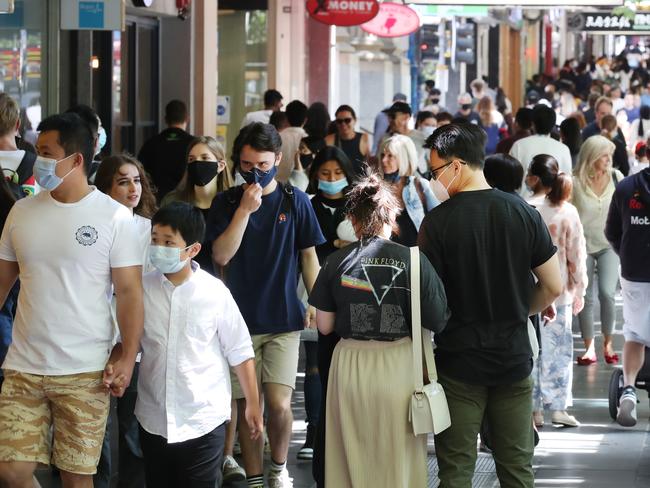
VICTORIA
Victoria closed its border to Greater Sydney, Northern Beaches and the Central Coast.
If people from those areas who are not Victorians enter the state they will be placed into 14 days of mandatory hotel quarantine.
Victorians are being told not to travel to Sydney. If they do, they will have to enter mandatory hotel quarantine for two weeks on return to Victoria.
A “traffic light” system of three different zones now exists where those from the Northern Beaches are in the “red zone”, and cannot enter without going into quarantine.
Anyone from the rest of NSW are in the “green zone” and can enter without restrictions.
Police have established checkpoints at certain locations along the Victorian-New South Wales border and will check permits to ensure that people hold a valid permit, including Victorian residents.
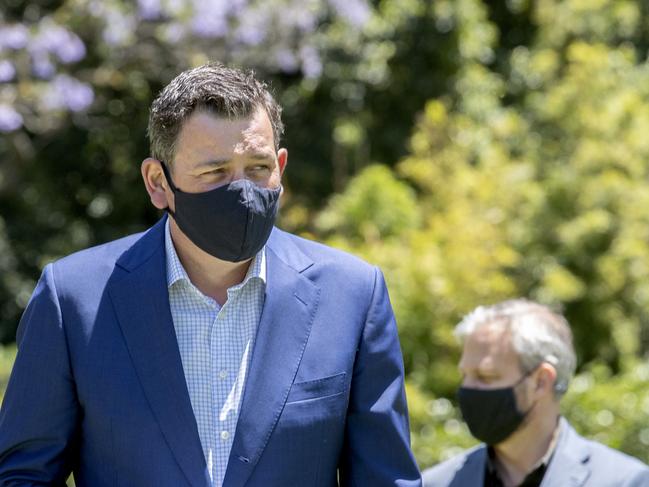
Restrictions apply in Victoria
Face masks are mandatory on public transport, in taxis or ride share vehicles and in large retail stores, unless an exemption applies.
You must wear a fitted face mask when you are in an airport, and it is strongly recommended that you wear a face mask while on your flight or if travelling to Victoria by bus or train.
While you are in Victoria, the state’s restrictions apply to you. Restrictions are enforced by Victoria Police and you can be fined.
SOUTH AUSTRALIA
South Australia also closed its border with Greater Sydney. A hard border against NSW is coming into force January 1.
If you travelled to South Australia from Northern Beaches Council (NSW) local government area or the suburbs of Cronulla, Lane Cove, Turramurra, Woolloomooloo, Lavendar Bay or Penrith between 11 December 2020 and 12:01am 21 December:
*You are required to self-quarantine for 14 days commencing on the last day you were in one of the above locations.
*You must get a COVID-19 test immediately within 24 hours (or as soon as possible), on day 5, and day 12.
*You may self-quarantine at a suitable location where you can be isolated. This requires complete separation from others in the household and if this is not suitable, then alternative accommodation will need to be arranged.
If you arrived from other locations in New South Wales on or after 17 December:
*You are not required to self-quarantine.
*You must get a COVID-19 test immediately within 24 hours, on day 5, and day 12 (Day 1 is considered 20 December) (unless you have symptoms, in which case you must self-isolate).
Travel inside South Australia
*Travel within most of South Australia is unrestricted, although people are advised to avoid unnecessary travel.
Some restrictions are currently in place in Aboriginal communities.
All travellers coming to South Australia are required to complete a Cross Border Travel Registration.
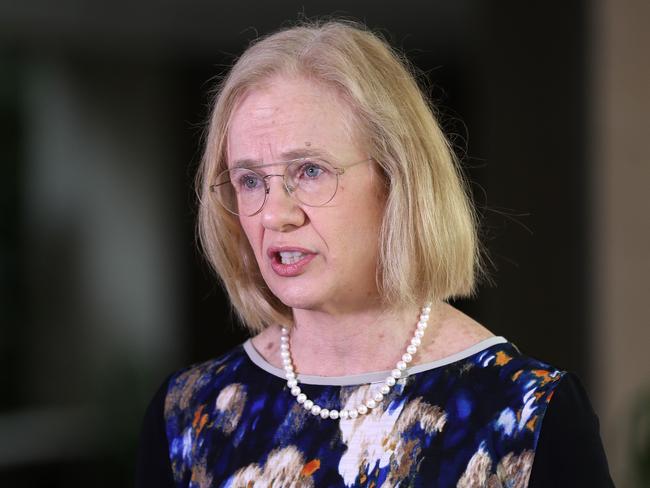
QUEENSLAND
Greater Sydney has been deemed a hotspot by the Queensland government.
Premier Palaszczuk asked any Queenslanders currently in Sydney to return home immediately, and any Queenslanders who recently returned from Greater Sydney to present for COVID-19 testing immediately, and could be required to quarantine.
These rules apply to visitors and returning Queensland residents.
Anyone can enter Queensland without a border pass, unless they have been in a COVID-19 hotspot, New South Wales or overseas in the last 14 days.
Currently, specific parts of New South Wales are designated COVID-19 hot spots, and restrictions are also in place for anyone wanting to travel into Queensland from anywhere in New South Wales.
If you have been in a hotspot within the last 14 days or since the hotspot was declared (whichever is shorter), you are no longer able to quarantine in Queensland and will be turned away at our border — unless you are exempt under the definitions within the Border Direction, which include:
*you’re a Queensland resident or are moving to Queensland
*to fulfil shared parenting and child contact arrangements
*obtain essential health care, or as a support person to a person obtaining essential health care.
If you’ve been in a COVID hotspot:
After 1am AEST Tuesday 22 December, Queensland residents who have been in a declared hotspot (currently Greater Sydney) since 11 December:
*must apply for a Queensland Border Declaration Pass before entering Queensland.
*can only enter Queensland by air and will be directed to quarantine in government arranged accommodation.
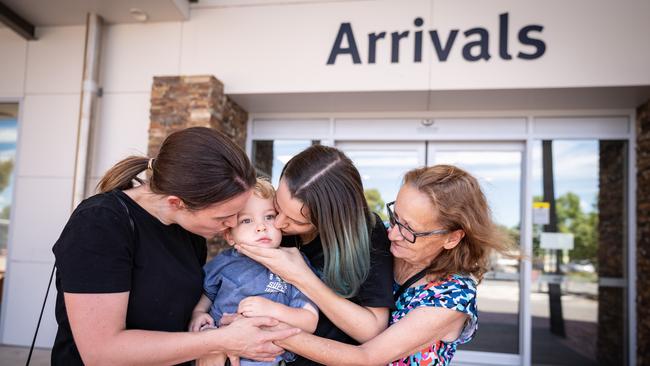
NORTHERN TERRITORY
The Northern Territory health minister, Natasha Fyles, said all of greater Sydney will become a hotspot from midnight December 31.
“This means anyone arriving from Greater Metropolitan Sydney into the Territory after midnight tonight will go into mandatory quarantine, either at the Top End in Howard Springs or in Alice Springs,” she said.
There are strict border controls in place for all arrivals to the Territory, including returning Territorians.
All arrivals to the Northern Territory (NT) must:
*fill in a Border Entry Form
*complete 14 days of mandatory supervised quarantine at your own expense*, if you have recently been in an active declared COVID-19 hot spot. This includes children returning from a hotspot.
The Northern Territory has declared the Northern Beaches local government area a hotspot.
Anyone planning to come have been advised to cancel their travel. Those who have been in the Northern Beaches in the 14 days before they arrive must enter supervised quarantine, in either Alice Springs or Darwin, and pay $2500 per person.
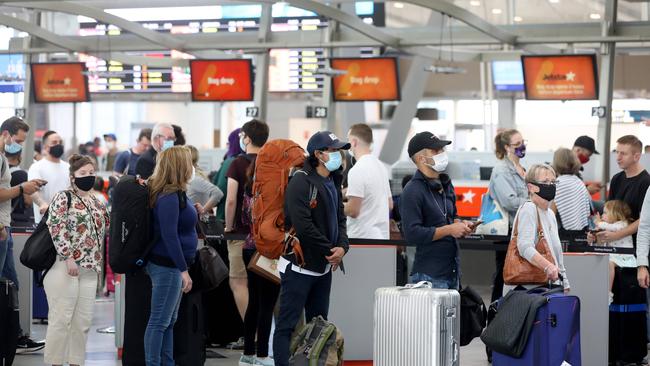
TASMANIA
Tasmania has also declared the Northern Beaches local government area a hotspot. People from this area are not permitted to enter Tasmania.
Anyone who is already in Tasmania and has been in the Northern Beaches on or after December 11 must immediately self-isolate.
ACT
The ACT has no border restrictions but those who were in the Northern Beaches area from December 11 need to immediately self-isolate and get tested.
WESTERN AUSTRALIA
Western Australia reinstated its hard border as of Sunday night for NSW. No one can travel there unless they are one of the following:
* active military personnel
* a Commonwealth MP
* a senior government official
* anyone who works in transport, freight and logistics
* anyone given approval by the state emergency co-ordinator
* those who have a compassionate reason – including those who travelled recently and need to return
Each person’s case here will be reviewed on a case-by-case basis.
Those who were in NSW since December 11 and arrive must go into hotel quarantine for 14 days.
Those already in WA but came from NSW since December 11 must get tested and self-isolate until they get a negative result.
From 12.01am, Friday 25, December, travel from South Australia into Western Australia will be classified as ‘very low risk’, subject to no further outbreaks.
Travellers will be subject to certain conditions including the mandatory completion of a G2G registration and health screening upon arrival.
Anyone entering WA from SA prior to 12.01am, Friday, 25 December must undertake and complete their 14-days of self-quarantine.
In hotel quarantine:
*High-risk assessments of quarantining travellers will now be done under a new “matrix” that standardises how authorities will deal with “travellers who have either breached their quarantine requirements or have indicated that they intend to.” It also means a “high-risk hotel” will be established for those cases.
*New emergency management powers will be given to security guards at the state-run hotel to be able to better enforce quarantine
*Physical barriers will be installed at the hotels, to prevent anyone trying to escape.
The changes come after a woman walked out of hotel quarantine in Perth.
Originally published as Victoria and SA to close border with NSW amid new COVID-19 cases, WA shuts out Victoria


